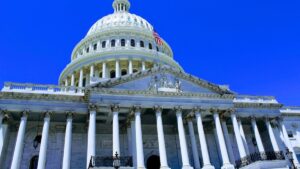
The upper house of the U.S. Congress (Senate) has passed a bill to provide aid to Ukraine. There were 79 votes in favor.
The law is to be signed by US President Joe Biden in the near future.
As reported, the bill approved on April 22 by the lower house of the US Congress (House of Representatives) provides for the allocation of almost $61 billion for purposes related to the support of Ukraine.
In addition to assistance to Ukraine, the package also includes $26 billion in aid to Israel, $8 billion to support US allies in the Indo-Pacific, as well as provisions for new sanctions against Russia, China, and Iran and the US President’s authority to use frozen Russian assets for the benefit of Ukraine.
April 23 President Zelenskyy has a phone conversation with US President Joseph Biden, during which Biden assures him that if the bill is approved by the Senate, he will immediately sign it into law.
The White House website confirms Biden’s words that his administration will quickly provide significant new security assistance packages for Ukraine in combat and air defense as soon as the Senate passes the supplemental national security package and he signs it into law.
For his part, Ukrainian President Volodymyr Zelenskyy made it clear that Ukraine would receive long-range ATACMS missiles as part of the US aid package. “And today’s result is that all the dots have been dotted in the ATACMS agreement for Ukraine. Thank you, Mr. President! Thank you, Congress! Thank you, America!” he said in a video message on Monday.
The provision of missiles with a range of up to 300 kilometers has been a request of Kyiv for the past year, but the US administration has constantly postponed the issue. The missiles are provided for in a congressional resolution passed on Saturday, but it contains a reference to the administration’s ability to refuse to deliver them if it is in the national security interest.

The U.S. Senate has approved a temporary funding bill aimed at averting a government shutdown, previously approved by the House of Representatives, Reuters reported on Saturday.
The Senate, with a Democratic majority of 88 to 9, voted to pass the measure to avoid the fourth partial shutdown of the federal government in a decade, sending it to President Joe Biden to sign into law before a deadline of 12:01 a.m. Eastern Time (07:01 a.m. Kyiv time – IF-U).
Earlier, the House of Representatives voted 335 to 91 to fund the government through November 17, with more Democrats than Republicans supporting it.
“The American people can breathe a sigh of relief: There will be no government shutdown tonight,” Senate Democratic Majority Leader Chuck Schumer said after the vote. “From the beginning, Democrats have said that the only solution to avoid a shutdown is bipartisanship, and we are pleased that Speaker McCarthy has finally listened to our message.”
Democratic Senator Michael Bennett held up the bill for several hours in an attempt to negotiate a deal on further aid to Ukraine.
“While I would have preferred to pass the bill now with additional assistance for Ukraine, which has bipartisan support in both the House and Senate, it is easier to help Ukraine with an open government than if it were closed,” said Democratic Senator Chris Van Hollen.
Earlier it was reported that the bill on temporary funding does not include US assistance to Ukraine.

The U.S. Senate unanimously adopted a resolution in support of Kyiv on Thursday evening, The Hill reports.
“This was a very significant resolution that we passed. It was led by Senators Shaheen [democrat Jeanne Shaheen] and Portman [republican Rob Portman] and sends a very strong message to Mr. Putin that the United States Senate, Democrats and Republicans of all different ideologies, are united in defending Ukraine in the ways that the administration sees fit,” the Hill quoted Senate Majority Leader Charles Schumer as saying.
And the fate of the resolution was in limbo earlier Thursday after republican Sen. Rand Paul warned that he would object to quickly passing it without changes, The Hill said.
Because senators wanted to fast-track passage of the resolution, they needed buy-in from all 100 senators, it said.
According to The Hill, sponsors of the resolution made changes to address Paul’s concerns, including adding language specifying that the resolution, which is nonbinding, was not meant to be viewed as authorization for the use of military force against Russia or authorizing U.S. troops for Ukraine.
The resolution was adopted due to the fact that senators could not agree on a bipartisan bill on sanctions against Russia initiated by Democrat Bob Menendez.
At the same time, Republicans in the Senate on Tuesday unveiled their own bill on sanctions against Russia.

The U.S. Senate has adopted a draft National Defense Authorization Act (NDAA), which foresees the expanded assistance to Ukraine in the sphere of security and defense in 2020 compared with 2019, the Ukrainian Embassy in the United States has reported.
“The U.S. Senate has passed a draft document proposing to expand the security assistance to Ukraine to $300 million,” the Embassy said.
According to the report, this is $50 million more than the current year’s sum. The document assigns $100 million only for lethal weapons.
“It is proposed to expand U.S. assistance in strengthening the defense capability of the Armed Forces of Ukraine by including coastal defenses; anti-ship missiles; and systems that enhance the effectiveness of troop control, in particular, air defense and coastal defense,” the Embassy said.
According to the procedure, the National Defense Authorization Act (NDAA) for 2020 will come into force after it is approved by the House of Representatives, as well as signed by the President of the United States.